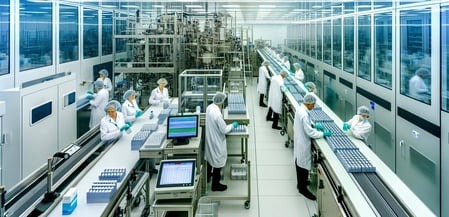Scalability and Flexibility with Modular Production Systems
With evolving regulations, fluctuating market demands, and the constant pressure to innovate, manufacturers must seek out strategies that allow them to adapt quickly and efficiently in the pharmaceutical industry. One such strategy gaining momentum is the adoption of modular production systems. These systems offer the ability to scale operations seamlessly, accommodate changing product portfolios, and optimize resource utilization.
In this blog, we'll explore the benefits of modular production systems and how integrating them with leading ERP, SCM, and MES systems like PlanetTogether can further enhance their capabilities.

Modular Production Systems
Modular production systems involve breaking down manufacturing processes into smaller, self-contained units or modules. These modules can be easily integrated, rearranged, or replicated to suit specific production needs. This modular approach offers several advantages:
Scalability: Traditional manufacturing setups often struggle to accommodate fluctuations in demand. Modular systems, on the other hand, allow for easy scalability. Need to increase production volume? Simply add more modules. Facing a downturn in demand? Scale back operations by removing modules. This ability to scale up or down quickly ensures optimal resource utilization and minimizes production bottlenecks.
Flexibility: In the pharmaceutical industry, product portfolios can vary greatly, with frequent changes in formulations, dosages, and packaging requirements. Modular production systems provide the flexibility to adapt to these changes without significant downtime or retooling. Manufacturers can configure modules to produce different products or adjust production parameters as needed, enabling them to respond swiftly to market demands and regulatory requirements.
Redundancy and Reliability: By decentralizing production into modular units, manufacturers can build redundancy into their operations. If one module encounters an issue or requires maintenance, other modules can continue operating, minimizing disruptions and ensuring continuity of supply. Additionally, modular systems often boast built-in redundancy features, such as backup power supplies and redundant equipment, further enhancing reliability and uptime.
Integrating Modular Production Systems with ERP, SCM, and MES
While modular production systems offer inherent advantages, their full potential can be realized through seamless integration with enterprise resource planning (ERP), supply chain management (SCM), and manufacturing execution systems (MES). Integration enables real-time data exchange, streamlines workflows, and enhances decision-making capabilities.

Let's explore how integration with leading systems like SAP, Oracle, Microsoft, Kinaxis, Aveva, and others, along with PlanetTogether, can optimize pharmaceutical manufacturing operations:
Real-Time Visibility and Control: Integrating modular production systems with ERP, SCM, and MES platforms provides stakeholders with real-time visibility into production processes, inventory levels, and supply chain dynamics. With access to accurate, up-to-date data, decision-makers can identify potential bottlenecks, allocate resources efficiently, and make informed decisions to optimize production schedules.
Dynamic Production Planning: By leveraging advanced planning and scheduling capabilities offered by platforms like PlanetTogether, manufacturers can create dynamic production plans that account for changing demand forecasts, resource availability, and production constraints. Integration with ERP systems ensures that production plans are aligned with overall business objectives, inventory targets, and customer orders, enabling proactive decision-making and improved responsiveness to market fluctuations.
Enhanced Quality Control and Compliance: In highly regulated industries such as pharmaceuticals, maintaining strict quality standards and regulatory compliance is non-negotiable. Integration with MES systems allows manufacturers to enforce standardized operating procedures, capture real-time production data, and track product genealogy throughout the manufacturing process. This level of traceability and control not only ensures product quality and safety but also facilitates compliance with regulatory requirements such as Good Manufacturing Practices (GMP) and serialization mandates.
Optimal Resource Utilization: Integration between modular production systems and ERP/MES platforms enables optimized resource utilization by synchronizing production schedules with resource availability, equipment capacities, and maintenance schedules. By minimizing idle time, reducing changeover times, and maximizing equipment uptime, manufacturers can improve overall equipment effectiveness (OEE) and drive operational efficiency.
In the competitive landscape of pharmaceutical manufacturing, agility, scalability, and flexibility are essential for success. Modular production systems, coupled with seamless integration with ERP, SCM, and MES platforms, offer a holistic approach to addressing these challenges. By breaking down manufacturing processes into modular units, optimizing production schedules, and leveraging real-time data insights, manufacturers can unlock new levels of efficiency, responsiveness, and compliance.
As the industry continues to evolve, embracing modular production systems and leveraging advanced technologies will be key to staying ahead of the curve and delivering high-quality products to patients worldwide.
Are you ready to take your manufacturing operations to the next level? Contact us today to learn more about how PlanetTogether can help you achieve your goals and drive success in your industry.
Topics: PlanetTogether Software, Optimal Resource Utilization, Integrating PlanetTogether, Dynamic Production Planning, Enhanced Quality Control and Compliance, Real-Time Visibility and Control, Modular Production Systems




















LEAVE A COMMENT